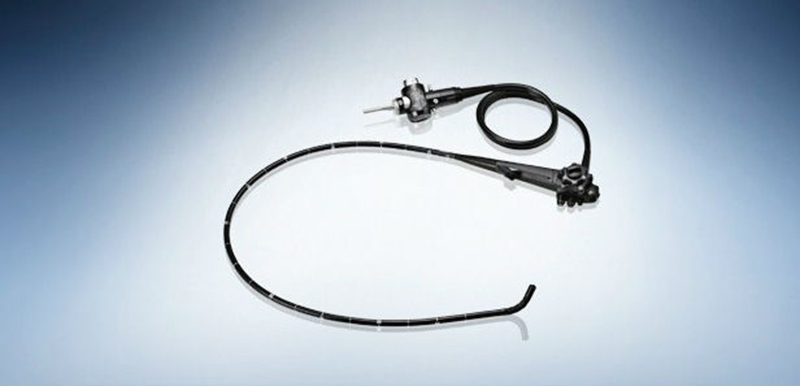
The Olympus TJF-Q180V duodenoscope (Courtesy of Olympus)
The U.S. Food and Drug Administration today cleared the Olympus TJF-Q180V duodenoscope with modifications to the device’s design and labeling intended to help reduce the risk of bacterial infections. Olympus will voluntarily recall its original model currently being used in healthcare facilities and make the needed repair as quickly as possible.
Duodenoscopes are used in more than 500,000 procedures each year as a less invasive way than traditional surgery to drain fluids from pancreatic and biliary ducts blocked by cancerous tumors, gallstones or other gastrointestinal conditions. While these devices play an important role in the treatment of patients, there is evidence that some have been associated with the transmission of infectious agents, including antibiotic-resistant infections.
Olympus modified its design of the elevator channel sealing mechanism to create a tighter seal and reduce the potential for leakage of patient fluids and tissue into the closed elevator channel. Leakage into this channel could pose an infection risk to subsequent patients exposed to the contaminated device because the sealed area cannot be cleaned and disinfected between uses. The company also plans to conduct annual inspections of each scope in use by facilities to identify any wear and tear on the elevator channel sealing mechanism or the presence of attached debris at the scope’s tip, which would require replacement of the potentially contaminated parts.
“We have made it a top priority to improve the safety of duodenoscopes and help protect patients from bacterial infections associated with these medical devices,” said William Maisel, M.D., M.P.H., deputy director for science and chief scientist in the FDA’s Center for Devices and Radiological Health. “The Olympus TJF-Q180V’s new design, as well as the new annual inspection program, is intended to reduce the risk of fluid leakage into the elevator channel, which in turn can reduce patient exposure to bacteria and other potential infections.”
In March 2014, the FDA notified Olympus that they needed to submit a premarket notification, called a 510(k), for their “closed” elevator channel model, which had never been cleared for marketing. In a lettersent to Olympus, the agency stated that design changes to this model from previous models, which resulted in a “closed” elevator channel rather than an “open” elevator channel, were significant and impacted the safe use of the device. The company subsequently submitted a 510(k) for the TJF-Q180V, and the FDA has now determined that the model with the newly designed mechanism is substantially equivalent to previously cleared duodenoscopes.
In addition, Olympus is initiating a voluntary recall of the original TJF-Q180V model from healthcare facilities to replace the elevator channel sealing mechanism at the tip of the scope with a new sealing mechanism; the new mechanism is designed to reduce the risk of fluid leakage into the elevator channel. The company estimates it will be able to correct the mechanism in the approximately 4,400 TJF-Q180V models currently used in health care facilities throughout the country by August 2016.
While awaiting repair, healthcare facilities may continue to use the Olympus TJF-Q180V, but they should meticulously follow the manufacturer’s reprocessing instructions.
Olympus plans to contact each facility that owns a TJF-Q180V duodenoscope and will provide instructions on returning the original TJF-Q180V for this replacement that Olympus will provide free of charge. Olympus estimates a four-day turnaround time to replace the elevator mechanism once it receives a duodenoscope from a health care facility.
On March 26, 2015, the FDA issued a Safety Communication to communicate validated instructions for cleaning and disinfecting of TJF-Q180V while the 510(k) submitted by Olympus was still under review. Those validated instructions remain the same and healthcare facilities should continue to use these validated instructions when reprocessing Olympus TJF-Q180V duodenoscopes.




